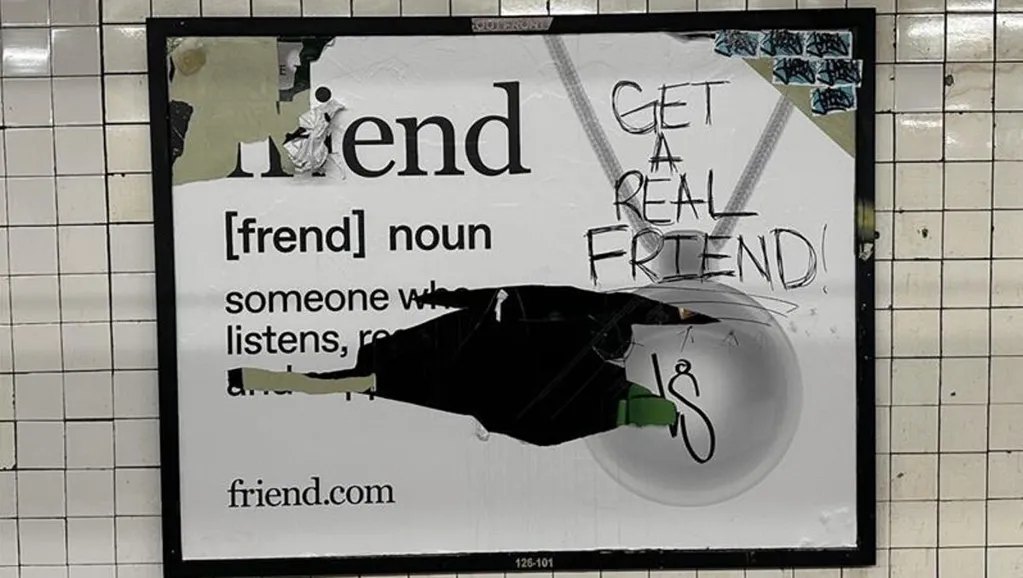For $429, you can buy a fluffy AI robot with 4 million personalities named Moflin.
If you have taken a New York City subway recently, you probably know about Friend. More than 10,000 posters advertising the tech startup popped up in MTA stations across the city at the end of August.
The ads feature a mostly white background with sayings ranging from definitions ("someone who listens to, responds, and supports you") to callouts of typical "friend" behaviors ("I'll binge the entire series with you"). Some also feature the product itself: a circular silver necklace programmed with artificial intelligence that constantly listens to its wearer and their surroundings and responds like, well, a companion. It's a moment of science fiction turned reality, and a sign of how far gone we are when it comes to artificial intelligence.
The posters are defaced with quotes and drawings almost as quickly as they're put up - in researching this story, I failed to find a single poster that hadn't been altered in some way. The quotes are always anti-AI: "AI would not care if you lived or died," "Get a real friend" and "Don't be a phoney, be a luddite" are a few that have been repeated on posters across New York.
I've previously said that I believe AI is inevitable: Much like the Internet, it has become part of our everyday life. A Gallup poll recently found that 99% of people use an AI-enabled device every day, and more than two-thirds do so without realizing it. At the same time, the survey found that the majority of Americans are skeptical about AI - something that is visible in the vandalism of these posters.
The $129 pendant was created by Avi Schiffmann, an irony-poisoned 22-year-old who has experience creating viral tech moments. I reached out to Schiffmann for this column, but he didn't get back to me.
"I think the closest relationship that I would describe talking to an AI like this to is, honestly, like God, in a way," Schiffmann told Fortune about the necklace in 2024. Yeah, nothing terrifying about that at all.
The product also seems to be a dud. For $129, you can buy the giant disc on a string that apparently can't even surveil you properly, as a Fortune review of the Friend pedant revealed when the author's breakup was not registered by the device. TikTok user millennial4lyfe noted her frustration with the fact that the product doesn't turn off, saying it "doesn't sit right" with her. But you'll be hard-pressed to find other users of the product: Only 1,000 Friend necklaces have been activated, according to The Atlantic.
If anything good has come out of Friend and its advertisements, it's that it has united New Yorkers in their hatred of artificial intelligence. There are several websites dedicated to the graffiti, including one where you can "vandalize" a digital version of the posters. The ads are clearly starting a conversation. Unfortunately, this is also what its creator wants.
"People don't vandalize an irrelevant ad, right?" Schiffmann told The New York Times.
Ah yes, relevance. The measurement by which tech bros seem to assess a product, as opposed to public health outcomes or spiritual enlightenment. After all, Facebook was so relevant it helped dissolve democracy within a decade - isn't that the gold standard for tech startups?
It's clear that business owners are trying to cash in on the loneliness epidemic that our society is faced with. They're even selling it to us in technology, one of the very things that has exacerbated our communal isolation.
Friend may be novel, but it isn't necessarily new - people had already been programming AI chatbots to act as friends and romantic partners before this. Yet it is not being marketed as a more precise search engine like ChatGPT, or a helpful business tool like Microsoft Copilot.
Even if its founders deny it, it clearly seems to be marketed as something that could replace human connection.
It's important that people remember that Friend is not a benevolent solution to loneliness - it is a product being sold to you by a tech startup. The people behind it do not care about you; they care about your money.
The real cure for loneliness will never be found in artificial intelligence. It will be found in our communities, with other people who may be experiencing loneliness.
Relationships with others aren't easy to build, but they are the only thing that will fill that void for good.
